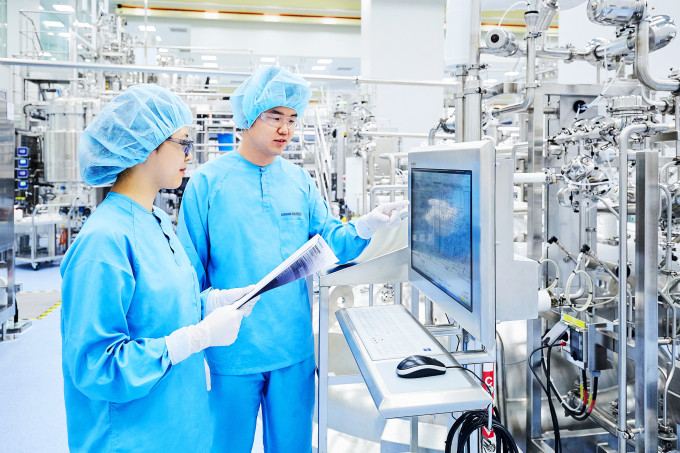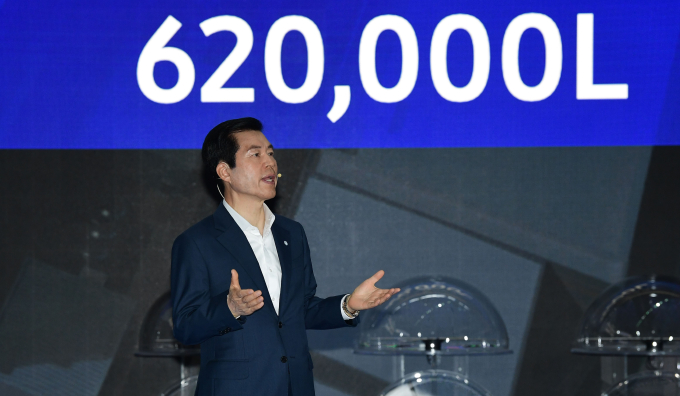COVID-19 treatment
Samsung Biologics’ focused approach pays off in 2020
By Jan 27, 2021 (Gmt+09:00)
3
Min read
Most Read
LG Chem to sell water filter business to Glenwood PE for $692 million


Kyobo Life poised to buy Japan’s SBI Group-owned savings bank


KT&G eyes overseas M&A after rejecting activist fund's offer


StockX in merger talks with Naver’s online reseller Kream


Mirae Asset to be named Korea Post’s core real estate fund operator



Samsung Biologics Co. delivered forecast-beating earnings this week, with its sales topping 1 trillion won ($905 million) for the first time in its nine-year history last year. Behind the impressive earnings growth was the world’s No.1 contract manufacturing organization’s (CMO) focused approach and swift response to the global pandemic, analysts said.
The new order from Eli Lilly & Co., of which the COVID-19 treatment won the US FDA approval of emergency use last November, provided a boost to Samsung’s fourth-quarter results. It helped increase the operating rate of Samsung’s third production line in Songdo, Incheon to as high as 50%, above the projected 20%.
Samsung had spent 850 billion won to build the third production line, west of Seoul. It was completed in 2017.
Its fourth-quarter operating profit spiked by 63.9% to 92.6 billion won, far above the consensus forecast of 52.4 billion won. Sales in the October-December quarter leapt by 36.7% to 375.3 billion won, beating the analysts forecast of 258.5 billion won. For all of 2020, sales came to 1.2 trillion won.
Analysts attributed the stronger-than-expected earnings to the rapid market growth in monoclonal antibodies, and the company’s concentration on biological drugs containing monoclonal antibodies. Monoclonal antibodies are made by cloning blood cells and used to treat diseases, including some types of cancer. Antibodies binding to a single primary antibody are called monoclonal antibodies.

Currently, Samsung has the world’s largest biological drug production capacity at 364,000 liters, ahead of Swiss contract manufacturer Lonza’s 300,000 liters. The South Korean company is aiming to increase its capacity to 620,000 liters by 2023, representing about 30% of global capacity. To do so, it will invest 1.74 trillion won to build its fourth plant in the same area of Songdo.
Production capacity is based on the reactor capacity used to culture cells which typically takes 20 days.
FOCUSED APPROACH
Samsung Biologics targeted the monoclonal antibody market which has a size big enough to produce profits, instead of diversifying into double antibody drugs and antibody-drug conjugates (ADCs) which recently came into the spotlight.
In contrast, Lonza has expanded its CMO capacity for both cell and gene therapies, as well as double antibodies and ADCs. The capacity expansion seems to be based on the conclusion that it might be hard to beat Korean and Chinese rivals in the monoclonal antibody market.
“Samsung’s concentration strategy, in which the company focused on monoclonal antibodies and streamlined the cell culture and purification processes to maximize profits, paid off,” Hyundai Securities analyst Park Byung-gook.
Since the coronavirus struck, Samsung has received a series of CMO orders for COVID-19 antibody treatments, including from GSK. Samsung also benefited from global biopharmaceutical companies’ diversification into Asian CMOs to prepare against Europe’s full lockdowns in the prolonged pandemic era.
“In a situation where it was difficult to outsource COVID-19 treatments to the CMOs in China, seen as the epicenter of this pandemic, Korean companies became the beneficiaries of the balloon effect,” said head of a Korean CMO company.
Early last year, Samsung also introduced an online tour system in which prospective customers can look around its whole production line measuring 28,022 square meters in Songdo, using virtual reality technology.
Using the contactless visit system, Samsung took $1.78 billion worth of orders following the COVID-19 outbreak, about 2.5 times the orders it received in all of 2019.
“Samsung Biologics’s operating rate will likely jump to the full-operating level of 80% this year,” said Samsung Securities analyst Seo Keun-hee.
Write to Woo-Sub Kim at duter@hankyung.com
Yeonhee Kim edited this article.
More to Read
-
 Samsung Biologics Jan-Sept profit beats entire 2019 gains
Samsung Biologics Jan-Sept profit beats entire 2019 gainsOct 21, 2020 (Gmt+09:00)
1 Min read -
 Samsung Biologics to double bioreactor capacity with $1.5 bn new plant
Samsung Biologics to double bioreactor capacity with $1.5 bn new plantAug 11, 2020 (Gmt+09:00)
1 Min read
Comment 0
LOG IN


